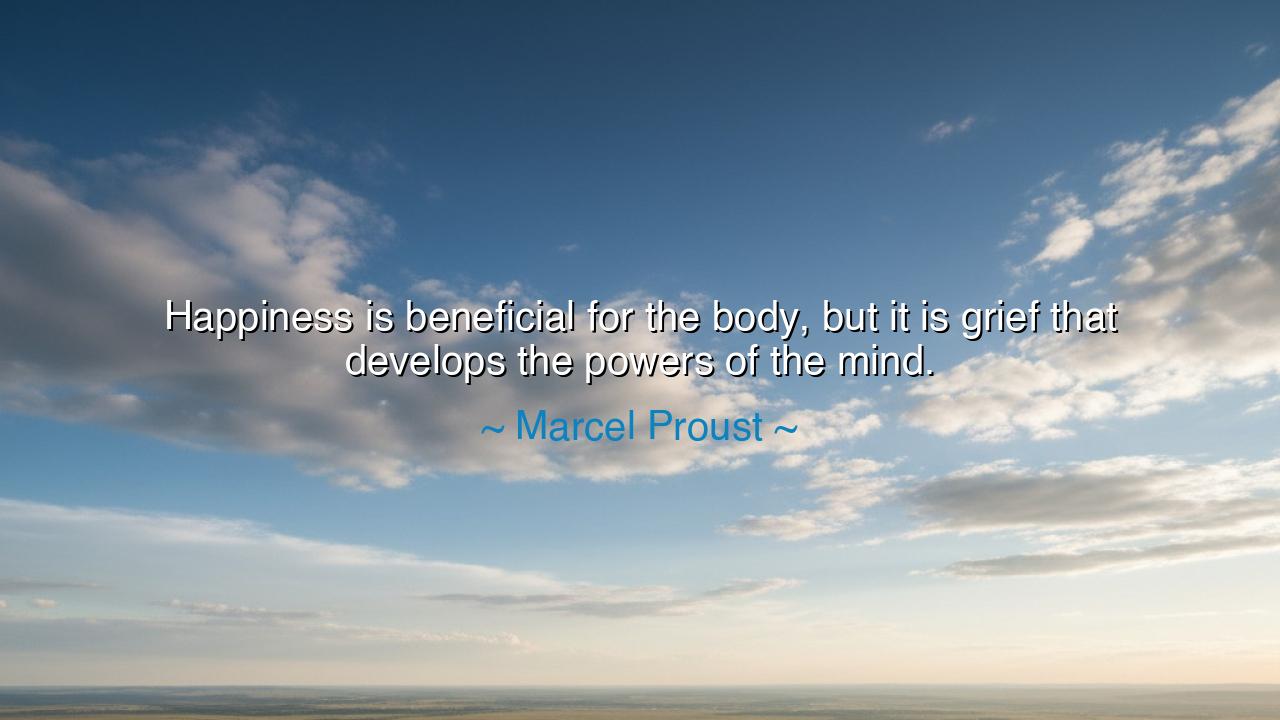
Happiness is beneficial for the body, but it is grief that
Happiness is beneficial for the body, but it is grief that develops the powers of the mind.






“Happiness is beneficial for the body, but it is grief that develops the powers of the mind.” Thus spoke Marcel Proust, the great chronicler of memory and the soul’s inner music. In this single sentence, he reveals the paradox that lies at the heart of human growth: that while happiness nourishes and comforts us, it is grief that awakens us to the depths of our being. Joy is sunlight — it warms and heals — but sorrow is the fire that forges. The body thrives on pleasure and peace, yet the mind, that divine forge of wisdom and art, is sharpened in the crucible of pain.
The meaning of this truth is both tender and fierce. When life smiles upon us, we rest; when it wounds us, we awaken. Happiness brings contentment, but it is fleeting, for it satisfies the senses more than the spirit. Grief, however, demands transformation. It strips away illusion, pride, and complacency, forcing us to look inward and confront what is real. In pain, the soul turns to reflection; it asks the great questions — Who am I? What matters? What endures? Thus, suffering becomes the school of consciousness. It does not destroy the wise; it refines them.
The origin of this insight lies in Proust’s own life — one marked by fragile health, isolation, and unfulfilled longing. Yet from that solitude and sorrow emerged In Search of Lost Time, one of the most profound meditations on human existence ever written. Proust understood that beauty is born not from ease, but from struggle. His years of illness, which confined him to his bed, became the furnace in which his thoughts were purified. What the body lost in strength, the mind gained in depth. For him, grief was not an enemy but a sculptor, chiseling away the surface to reveal the eternal form within.
History, too, bears witness to this law of the spirit. Consider Abraham Lincoln, whose life was marked by personal tragedy and national agony. He lost his mother as a child, his beloved son as a father, and led his people through the storm of civil war. Yet from his grief arose unmatched wisdom, compassion, and moral clarity. His melancholy did not cripple him; it deepened him. Through sorrow, he learned empathy — the ability to see beyond self, to understand the pain of others. Thus, his mind became a vessel for greatness, molded by grief into something vast and enduring.
To the ancients, this truth was sacred: Happiness sustains the body, but sorrow illuminates the soul. The warrior who never suffers defeat cannot understand valor. The artist who never weeps cannot paint the truth. The philosopher who never doubts cannot find wisdom. Even nature herself abides by this law — for the seed must split and die before the tree can grow. So it is with the soul: through the breaking of the heart, the mind learns to see beyond illusion into the eternal pattern of things.
Yet, Proust’s words are not a glorification of pain, but a call to embrace it as a teacher. When grief comes, do not curse it or flee. Sit with it. Listen. Let it speak. For in its dark voice lies hidden instruction — strength, compassion, insight, endurance. To suffer consciously is to grow in truth. The body may tremble, but the mind expands; the heart may break, but wisdom is born from its ruins. Through this alchemy, pain is transformed into understanding, and sorrow becomes the bridge to enlightenment.
The lesson, then, is clear: do not seek only happiness, for it is but half the path. Welcome also the seasons of grief, for they will teach you what joy cannot — the endurance of the spirit, the depth of thought, the nobility of compassion. When the world wounds you, do not say, “I am undone.” Say instead, “I am being remade.” For happiness tends the garden of the body, but grief tills the soil of the soul, preparing it for wisdom to take root. And in the fullness of time, from that dark soil will rise the golden fruit of understanding — the calm strength of one who has suffered and yet still loves, who has fallen and yet still sees the light.






AAdministratorAdministrator
Welcome, honored guests. Please leave a comment, we will respond soon